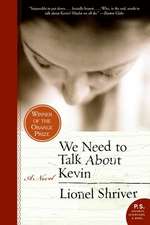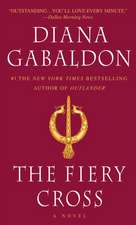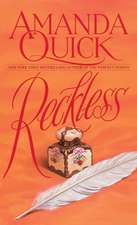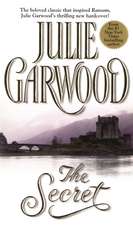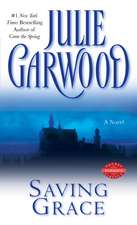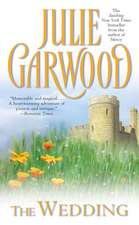Slightly Sinful: Bedwyn Saga
Autor Mary Baloghen Limba Engleză Paperback – 31 mar 2004
As the fires of war raged around him, Lord Alleyne Bedwyn was thrown from his horse and left for dead—only to awaken in the bedchamber of a ladies' brothel. Suddenly the dark, handsome diplomat has no memory of who he is or how he got there—yet of one thing he is certain: The angel who nurses him back to health is the woman he vows to make his own. But like him, Rachel York is not who she seems. A lovely young woman caught up in a desperate circumstance, she must devise a scheme to regain her stolen fortune. The dashing soldier she rescued from near-death could be her savior in disguise. There is just one condition: she must pose as his wife—a masquerade that will embroil them in a sinful scandal, where a man and a woman court impropriety with each daring step...with every taboo kiss that can turn passionate strangers into the truest of lovers.
Preț: 50.69 lei
Nou
Puncte Express: 76
Preț estimativ în valută:
9.70€ • 10.18$ • 8.05£
9.70€ • 10.18$ • 8.05£
Carte disponibilă
Livrare economică 20 martie-03 aprilie
Preluare comenzi: 021 569.72.76
Specificații
ISBN-13: 9780440236603
ISBN-10: 0440236606
Pagini: 368
Dimensiuni: 108 x 173 x 26 mm
Greutate: 0.18 kg
Editura: dell
Seria Bedwyn Saga
Locul publicării:United States
ISBN-10: 0440236606
Pagini: 368
Dimensiuni: 108 x 173 x 26 mm
Greutate: 0.18 kg
Editura: dell
Seria Bedwyn Saga
Locul publicării:United States
Notă biografică
New York Times bestselling, multi-award-winning author Mary Balogh grew up in Wales, land of sea and mountains, song and legend. She brought music and a vivid imagination with her when she came to Canada to teach. There she began a second career as a writer of books that always end happily and always celebrate the power of love. There are over four million copies of her Regency romances and historical romances in print.
Extras
Chapter One
Having spent almost all of his twenty-five years in England and therefore isolated from most of the hostilities that had ravaged the rest of Europe since the rise to power of Napoleon Bonaparte, Lord Alleyne Bedwyn, third brother of the Duke of Bewcastle, had no personal experience of pitched battles. But he had listened with avid interest to the war stories sometimes told by his elder brother, Lord Aidan Bedwyn, a recently retired cavalry colonel, and had thought he could picture such a scene.
He had been wrong.
He had imagined neatly deployed lines, the British and her allies on this side, the enemy on that, flat land like the playing fields of Eton between them. He had imagined cavalry and infantry and artillery, all pristine and picturesque in their various uniforms, moving about neatly and logically, like the pieces on a chessboard. He had imagined the rapid popping of gunfire, disturbing, but not obliterating, the silence. He had imagined clarity of vision, the ability to see all points of the battlefield at all times, the ability to assess the progress of the battle at every moment. He had imagined--if he had thought of it at all--clean, clear air to breathe.
He had been wrong on all counts.
He was not himself a military man. Recently he had decided that it was time he did something useful with his life and had embarked upon a career as a diplomat. He had been assigned to the embassy at the Hague under Sir Charles Stuart. But Sir Charles and a number of his staff, Alleyne included, had moved to Brussels while the Allied armies under the Duke of Wellington's command gathered there in response to a new threat from Napoleon Bonaparte, who had escaped from his exile on the island of Elba earlier in the spring and was raising a formidable army in France again. Now, today, the long-expected battle between the two forces was being fought on a rolling, hilly stretch of farmland south of the village of Waterloo. And Alleyne was there in the thick of it. He had volunteered to carry a letter from Sir Charles to Wellington and to bring back a reply.
He was thankful that he had ridden out from Brussels alone. He might have been unable to hide from any companion the fact that he had never been even half so frightened in his life.
The noise of the great guns was the worst. It went beyond sound. It deafened his eardrums and pounded low in his abdomen. Then there was all the smoke, which choked his lungs and set his eyes to watering and made it virtually impossible to see clearly more than a few yards in any direction. There were horses and men milling about everywhere in the mud caused by last night's torrential rain, in what seemed like total confusion to Alleyne. There were officers and sergeants bellowing out commands and somehow making themselves heard. There was the acrid smell of smoke and the added stench of what he assumed must be blood and guts. Even through the smoke he could see dead and wounded wherever he looked.
It was like a scene straight from hell.
This, he realized, was the reality of war.
The Duke of Wellington had a reputation for always being in the place where the fighting was most fierce, recklessly exposing himself to danger and somehow escaping unscathed. Today was no exception. After asking at least a dozen officers for information concerning his whereabouts, Alleyne finally found his man on an open rise of land looking down on the strategically placed farmhouse of La Haye Sainte, which the French were fiercely attacking and a troop of German soldiers was just as ferociously defending. The duke could not have been more openly exposed to enemy fire if he had tried. Alleyne delivered his letter and then concentrated his attention upon keeping his horse under control. He tried not even to think of the danger to his person, but he was painfully aware of the roar of cannonballs close by and the whistle of musket balls. Terror seeped into his very bones.
He had to wait for Wellington to read the letter and then dictate a reply to one of his aides. The wait seemed interminable to Alleyne, who watched the battle for control of the farm--whenever he could see it through the billowing smoke of thousands of guns. He watched men die and waited to die himself. And if he survived, he wondered, would he ever hear again? Or be sane again? Finally he had his letter, stowed it safely in an inner pocket, and turned to leave. He had never been more thankful for anything in his life.
How had Aidan tolerated this life for twelve years? By what miracle had he survived to tell of it and to marry Eve and settle to a life in rural England?
When he felt a sharp pain in his upper left thigh, Alleyne thought at first that he had twisted awkwardly in the saddle and pulled a muscle. But when he glanced down, he saw the torn hole in his breeches and the blood spurting from it and realized the truth almost as if he were a spectator looking down dispassionately upon himself.
"By Jove," he said aloud, "I have been hit."
His voice sounded as if it came from a long way distant. It was drowned out by the pounding of the guns and his fuzzy-eared deafness and by the ringing sound within his head, suddenly turned icy cold with the shock of knowing that he had been shot.
It did not occur to him to stop or dismount or seek medical attention. He could think only of getting away from there, of returning without delay to Brussels and safety. He had important things to do there. For the moment he could not remember what any of those things were, but he knew he could not afford to delay.
Besides, panic was clawing at his back.
He rode onward for a few minutes, until he felt more confident of being out of harm's way. By that time his leg was hurting like the very devil. Worse, he was still bleeding copiously. He had nothing with which to bind the wound except a large handkerchief. When he pulled it out of his pocket he feared that it would not reach about his thigh, but corner-to-corner it was longer than he had estimated. With clammy, shaking hands he bound it tightly above the tear in his breeches, wincing and nearly fainting from the pain. The ball, he realized, must be embedded in his thigh. Agony tore through him with every pulse beat. He was dizzy with shock.
Thousands of men were wounded far worse than this, he told himself sternly as he rode on--far worse. It would be cowardly to dwell upon his own pain. He must force himself to rise above it. Once he had reached Brussels, he would complete his errand and then get a physician to dig out the ball--perish the thought!--and patch him up. He would survive--he hoped. So would his leg--he hoped.
Soon he was in the Forest of Soignes, riding a little to the west side of the road in order to avoid all the heavy traffic proceeding along it in both directions. He passed numerous soldiers in the forest, a few of them dead, many of them wounded like himself, a large number of them deserters from the horror of the battlefront--or so he suspected. He could hardly blame them.
As the shock gradually subsided, the pain grew steadily worse, if that were possible. The bleeding, though somewhat retarded by the tourniquet he had fashioned, continued. He felt cold and light-headed. He had to get back to Morgan.
Ah, yes, that was it!
Morgan, his younger sister--she was only eighteen years old--was in Brussels, her chaperons having rashly waited there too long instead of leaving with most of the other English visitors who had flocked to the city during the past couple of months. The Caddicks were now virtually trapped in Brussels, since all vehicles had been requisitioned by the army--and therefore so was Morgan. But worse than that, they had allowed her out of the house alone today of all days. When he had ridden out of Brussels earlier, he had been startled to find her at the Namur Gates with some other women, tending the wounded who had already been straggling into the city.
He had told her he would return at the earliest possible moment and see to it that she was taken back to safety, preferably all the way home to England. He would beg temporary leave from his post and take her himself. He dared not think of what might happen to her if the French won the victory today.
He had to get back to Morgan. He had promised Wulfric--his eldest brother, the Duke of Bewcastle--that he would keep an eye on her even though Wulf had entrusted her to the care of the Earl and Countess of Caddick when she had begged to be allowed to come to Brussels with their daughter, Lady Rosamond Havelock, her friend. Good Lord, she was little more than a child, and she was his sister.
Ah, yes, and he had to deliver his letter to Sir Charles Stuart. He had almost forgotten the wretched letter. What was so important, he wondered, that he had had to ride into battle and out again merely to deliver a note and bring back a reply? An invitation to dinner that evening? It would not surprise him if it were something as trivial as that. He was already having niggling doubts about his chosen career. Perhaps he ought to have taken one of the parliamentary seats that Wulf controlled--except that his interest in politics was minimal. Sometimes his lack of direction in life disturbed him. Even if a man had enough personal wealth to carry him comfortably through life without any exertion on his part, as he did, there ought to be something that fired his blood and elevated his soul.
His leg felt like a balloon expanded to the point of bursting. It also, paradoxically, felt as if it were stuck full of knives and powered by a million pulse points. A cold fog seemed to be swirling inside his head. The very air he breathed was icy.
Morgan . . . He fixed her image in his mind--young, vibrant, headstrong Morgan, his sister, the only one of his five siblings who was younger than he. He had to get back to her.
How much farther to Brussels? He had lost track of both time and distance. He could still hear the guns. He was still in the forest. The road was still to his right, clogged with carts and wagons and people. Just a couple of weeks ago he had attended a moonlit picnic hosted by the Earl of Rosthorn here in the forest. It was almost impossible to realize that it was the same place. Rosthorn, whose reputation was far from savory, had dallied with Morgan almost to the point of indiscretion on that occasion and had provoked considerable gossip.
Alleyne gritted his teeth. He was not sure how much farther he could go. He had not known it was possible to feel such pain. He felt jarred by every step his horse took. Yet he dared not dismount. He certainly would not be able to walk alone. He called upon every reserve of strength and willpower and rode onward. If he could just reach Brussels . . .
But the forest floor was uneven, and his horse had undoubtedly been as frightened as he by the dire conditions of the battlefield and was now bewildered by the dead weight of the unresponsive rider on its back. The horse stumbled over a tree root and then reared in alarm. It was nothing that under ordinary circumstances Alleyne could not have controlled with ease. But these were not ordinary circumstances. He toppled heavily backward. Fortunately his boots came free of the stirrups as he did so. But he was in no condition to employ any of the defensive moves that might somehow have cushioned his fall. He fell heavily and landed hard, his head bouncing off that same offending tree root as he did so.
He was knocked instantly unconscious. Indeed, he was so pale from the loss of blood and from the fall that anyone coming upon him afterward would have assumed that he was dead. It would not even have been a startling assumption. The Forest of Soignes, even this far north of the battlefield, was littered with the bodies of the dead.
His horse pawed the air once more and galloped away.
The quiet, seemingly respectable house on the Rue d'Aremberg in Brussels that four English "ladies" had rented two months before was in reality a brothel. Bridget Clover, Flossie Streat, Geraldine Ness, and Phyllis Leavey had come over together from London on the calculated--and correct--assumption that business in Brussels would be brisk until all the military madness had somehow been resolved. And they were very close to achieving the ambition that had brought them together in a working partnership and fast friendship four years before. Their goal, their dream, was to save enough of their earnings to enable them to retire from their profession and purchase a house somewhere in England that they would run jointly as a respectable ladies' boarding house. They had had every reason to expect that by the time they returned to England they would be free women.
But their dream had just been shattered.
On the very day when the guns of war booming somewhere south of the city proclaimed the fact that hostilities had finally been engaged and a colossal battle was raging, they had learned that all was lost in their personal world, that all their hard-earned money was gone.
Stolen.
And it was all Rachel York's fault.
She had brought the news herself, coming back into the city from the north instead of continuing on her way home to England as almost all the other British visitors to Brussels were doing. Even many of the local residents were fleeing northward. But Rachel had returned. She had come back to tell the ladies the terrible truth. But instead of raining down recriminations upon her head, as she had fully expected they would do, they had actually taken her in, since she had nowhere else to go, and given her the one spare bedchamber in the house as her own.
She was now the newest resident of the brothel.
The very thought of it might have horrified her just a short while ago. Or it might just as easily have amused her, since she had a healthy sense of humor. But right now, at this moment, she felt too wretched to react in any way at all to the simple fact that she was now living with whores.
Having spent almost all of his twenty-five years in England and therefore isolated from most of the hostilities that had ravaged the rest of Europe since the rise to power of Napoleon Bonaparte, Lord Alleyne Bedwyn, third brother of the Duke of Bewcastle, had no personal experience of pitched battles. But he had listened with avid interest to the war stories sometimes told by his elder brother, Lord Aidan Bedwyn, a recently retired cavalry colonel, and had thought he could picture such a scene.
He had been wrong.
He had imagined neatly deployed lines, the British and her allies on this side, the enemy on that, flat land like the playing fields of Eton between them. He had imagined cavalry and infantry and artillery, all pristine and picturesque in their various uniforms, moving about neatly and logically, like the pieces on a chessboard. He had imagined the rapid popping of gunfire, disturbing, but not obliterating, the silence. He had imagined clarity of vision, the ability to see all points of the battlefield at all times, the ability to assess the progress of the battle at every moment. He had imagined--if he had thought of it at all--clean, clear air to breathe.
He had been wrong on all counts.
He was not himself a military man. Recently he had decided that it was time he did something useful with his life and had embarked upon a career as a diplomat. He had been assigned to the embassy at the Hague under Sir Charles Stuart. But Sir Charles and a number of his staff, Alleyne included, had moved to Brussels while the Allied armies under the Duke of Wellington's command gathered there in response to a new threat from Napoleon Bonaparte, who had escaped from his exile on the island of Elba earlier in the spring and was raising a formidable army in France again. Now, today, the long-expected battle between the two forces was being fought on a rolling, hilly stretch of farmland south of the village of Waterloo. And Alleyne was there in the thick of it. He had volunteered to carry a letter from Sir Charles to Wellington and to bring back a reply.
He was thankful that he had ridden out from Brussels alone. He might have been unable to hide from any companion the fact that he had never been even half so frightened in his life.
The noise of the great guns was the worst. It went beyond sound. It deafened his eardrums and pounded low in his abdomen. Then there was all the smoke, which choked his lungs and set his eyes to watering and made it virtually impossible to see clearly more than a few yards in any direction. There were horses and men milling about everywhere in the mud caused by last night's torrential rain, in what seemed like total confusion to Alleyne. There were officers and sergeants bellowing out commands and somehow making themselves heard. There was the acrid smell of smoke and the added stench of what he assumed must be blood and guts. Even through the smoke he could see dead and wounded wherever he looked.
It was like a scene straight from hell.
This, he realized, was the reality of war.
The Duke of Wellington had a reputation for always being in the place where the fighting was most fierce, recklessly exposing himself to danger and somehow escaping unscathed. Today was no exception. After asking at least a dozen officers for information concerning his whereabouts, Alleyne finally found his man on an open rise of land looking down on the strategically placed farmhouse of La Haye Sainte, which the French were fiercely attacking and a troop of German soldiers was just as ferociously defending. The duke could not have been more openly exposed to enemy fire if he had tried. Alleyne delivered his letter and then concentrated his attention upon keeping his horse under control. He tried not even to think of the danger to his person, but he was painfully aware of the roar of cannonballs close by and the whistle of musket balls. Terror seeped into his very bones.
He had to wait for Wellington to read the letter and then dictate a reply to one of his aides. The wait seemed interminable to Alleyne, who watched the battle for control of the farm--whenever he could see it through the billowing smoke of thousands of guns. He watched men die and waited to die himself. And if he survived, he wondered, would he ever hear again? Or be sane again? Finally he had his letter, stowed it safely in an inner pocket, and turned to leave. He had never been more thankful for anything in his life.
How had Aidan tolerated this life for twelve years? By what miracle had he survived to tell of it and to marry Eve and settle to a life in rural England?
When he felt a sharp pain in his upper left thigh, Alleyne thought at first that he had twisted awkwardly in the saddle and pulled a muscle. But when he glanced down, he saw the torn hole in his breeches and the blood spurting from it and realized the truth almost as if he were a spectator looking down dispassionately upon himself.
"By Jove," he said aloud, "I have been hit."
His voice sounded as if it came from a long way distant. It was drowned out by the pounding of the guns and his fuzzy-eared deafness and by the ringing sound within his head, suddenly turned icy cold with the shock of knowing that he had been shot.
It did not occur to him to stop or dismount or seek medical attention. He could think only of getting away from there, of returning without delay to Brussels and safety. He had important things to do there. For the moment he could not remember what any of those things were, but he knew he could not afford to delay.
Besides, panic was clawing at his back.
He rode onward for a few minutes, until he felt more confident of being out of harm's way. By that time his leg was hurting like the very devil. Worse, he was still bleeding copiously. He had nothing with which to bind the wound except a large handkerchief. When he pulled it out of his pocket he feared that it would not reach about his thigh, but corner-to-corner it was longer than he had estimated. With clammy, shaking hands he bound it tightly above the tear in his breeches, wincing and nearly fainting from the pain. The ball, he realized, must be embedded in his thigh. Agony tore through him with every pulse beat. He was dizzy with shock.
Thousands of men were wounded far worse than this, he told himself sternly as he rode on--far worse. It would be cowardly to dwell upon his own pain. He must force himself to rise above it. Once he had reached Brussels, he would complete his errand and then get a physician to dig out the ball--perish the thought!--and patch him up. He would survive--he hoped. So would his leg--he hoped.
Soon he was in the Forest of Soignes, riding a little to the west side of the road in order to avoid all the heavy traffic proceeding along it in both directions. He passed numerous soldiers in the forest, a few of them dead, many of them wounded like himself, a large number of them deserters from the horror of the battlefront--or so he suspected. He could hardly blame them.
As the shock gradually subsided, the pain grew steadily worse, if that were possible. The bleeding, though somewhat retarded by the tourniquet he had fashioned, continued. He felt cold and light-headed. He had to get back to Morgan.
Ah, yes, that was it!
Morgan, his younger sister--she was only eighteen years old--was in Brussels, her chaperons having rashly waited there too long instead of leaving with most of the other English visitors who had flocked to the city during the past couple of months. The Caddicks were now virtually trapped in Brussels, since all vehicles had been requisitioned by the army--and therefore so was Morgan. But worse than that, they had allowed her out of the house alone today of all days. When he had ridden out of Brussels earlier, he had been startled to find her at the Namur Gates with some other women, tending the wounded who had already been straggling into the city.
He had told her he would return at the earliest possible moment and see to it that she was taken back to safety, preferably all the way home to England. He would beg temporary leave from his post and take her himself. He dared not think of what might happen to her if the French won the victory today.
He had to get back to Morgan. He had promised Wulfric--his eldest brother, the Duke of Bewcastle--that he would keep an eye on her even though Wulf had entrusted her to the care of the Earl and Countess of Caddick when she had begged to be allowed to come to Brussels with their daughter, Lady Rosamond Havelock, her friend. Good Lord, she was little more than a child, and she was his sister.
Ah, yes, and he had to deliver his letter to Sir Charles Stuart. He had almost forgotten the wretched letter. What was so important, he wondered, that he had had to ride into battle and out again merely to deliver a note and bring back a reply? An invitation to dinner that evening? It would not surprise him if it were something as trivial as that. He was already having niggling doubts about his chosen career. Perhaps he ought to have taken one of the parliamentary seats that Wulf controlled--except that his interest in politics was minimal. Sometimes his lack of direction in life disturbed him. Even if a man had enough personal wealth to carry him comfortably through life without any exertion on his part, as he did, there ought to be something that fired his blood and elevated his soul.
His leg felt like a balloon expanded to the point of bursting. It also, paradoxically, felt as if it were stuck full of knives and powered by a million pulse points. A cold fog seemed to be swirling inside his head. The very air he breathed was icy.
Morgan . . . He fixed her image in his mind--young, vibrant, headstrong Morgan, his sister, the only one of his five siblings who was younger than he. He had to get back to her.
How much farther to Brussels? He had lost track of both time and distance. He could still hear the guns. He was still in the forest. The road was still to his right, clogged with carts and wagons and people. Just a couple of weeks ago he had attended a moonlit picnic hosted by the Earl of Rosthorn here in the forest. It was almost impossible to realize that it was the same place. Rosthorn, whose reputation was far from savory, had dallied with Morgan almost to the point of indiscretion on that occasion and had provoked considerable gossip.
Alleyne gritted his teeth. He was not sure how much farther he could go. He had not known it was possible to feel such pain. He felt jarred by every step his horse took. Yet he dared not dismount. He certainly would not be able to walk alone. He called upon every reserve of strength and willpower and rode onward. If he could just reach Brussels . . .
But the forest floor was uneven, and his horse had undoubtedly been as frightened as he by the dire conditions of the battlefield and was now bewildered by the dead weight of the unresponsive rider on its back. The horse stumbled over a tree root and then reared in alarm. It was nothing that under ordinary circumstances Alleyne could not have controlled with ease. But these were not ordinary circumstances. He toppled heavily backward. Fortunately his boots came free of the stirrups as he did so. But he was in no condition to employ any of the defensive moves that might somehow have cushioned his fall. He fell heavily and landed hard, his head bouncing off that same offending tree root as he did so.
He was knocked instantly unconscious. Indeed, he was so pale from the loss of blood and from the fall that anyone coming upon him afterward would have assumed that he was dead. It would not even have been a startling assumption. The Forest of Soignes, even this far north of the battlefield, was littered with the bodies of the dead.
His horse pawed the air once more and galloped away.
The quiet, seemingly respectable house on the Rue d'Aremberg in Brussels that four English "ladies" had rented two months before was in reality a brothel. Bridget Clover, Flossie Streat, Geraldine Ness, and Phyllis Leavey had come over together from London on the calculated--and correct--assumption that business in Brussels would be brisk until all the military madness had somehow been resolved. And they were very close to achieving the ambition that had brought them together in a working partnership and fast friendship four years before. Their goal, their dream, was to save enough of their earnings to enable them to retire from their profession and purchase a house somewhere in England that they would run jointly as a respectable ladies' boarding house. They had had every reason to expect that by the time they returned to England they would be free women.
But their dream had just been shattered.
On the very day when the guns of war booming somewhere south of the city proclaimed the fact that hostilities had finally been engaged and a colossal battle was raging, they had learned that all was lost in their personal world, that all their hard-earned money was gone.
Stolen.
And it was all Rachel York's fault.
She had brought the news herself, coming back into the city from the north instead of continuing on her way home to England as almost all the other British visitors to Brussels were doing. Even many of the local residents were fleeing northward. But Rachel had returned. She had come back to tell the ladies the terrible truth. But instead of raining down recriminations upon her head, as she had fully expected they would do, they had actually taken her in, since she had nowhere else to go, and given her the one spare bedchamber in the house as her own.
She was now the newest resident of the brothel.
The very thought of it might have horrified her just a short while ago. Or it might just as easily have amused her, since she had a healthy sense of humor. But right now, at this moment, she felt too wretched to react in any way at all to the simple fact that she was now living with whores.
Descriere
In this outing of Balogh's saga of the six Bedwyn brothers and sisters, passionate middle son Alleyne Bedwyn is cut off from his past only to find his future with a beautiful woman he'll risk everything to love. Original.




